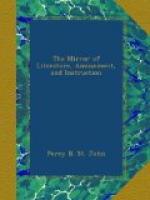In Cowper’s time, Mail-Coaches were hardly set up; but he has beautifully described the coming in of the Post-Boy:—
“Hark! ’tis the twanging horn
o’er yonder bridge,
That with its wearisome but needful length
Bestrides the wintry flood, in which the
moon
Sees her unwrinkled face reflected bright;—
He comes, the herald of a noisy world,
With spattered boots, strapped waist,
and frozen locks;
News from all nations lumbering at his
back.
True to his charge, the close packed load
behind,
Yet careless what he brings, his one concern
Is to conduct it to the destined inn;
And having dropped the expected bag, pass
on.
He whistles as he goes, light-hearted
wretch!
Cold and yet cheerful; messenger of grief
Perhaps to thousands, and of joy to some;
To him indifferent whether grief or joy.
Houses in ashes and the fall of stocks.
Births, deaths, and marriages, epistles
wet
With tears that trickled down the writer’s
cheeks
Fast as the periods from his fluent quill,
Or charged with amorous sighs of absent
swains
Or nymphs responsive, equally affect
His horse and him, unconscious of them
all.”
And yet, notwithstanding this, and so many other passages that seem like the very marrow of our being, Lord Byron denies that Cowper was a poet!—The Mail-Coach is an improvement on the Post-Boy; but I fear it will hardly bear so poetical a description. The picturesque and dramatic do not keep pace with the useful and mechanical. The telegraphs that lately communicated the intelligence of the new revolution to all France within a few hours, are a wonderful contrivance; but they are less striking and appalling than the beacon fires (mentioned by Aeschylus,) which, lighted from hill-top to hill-top, announced the taking of Troy and the return of Agamemnon.
Monthly Magazine.
* * * * *




